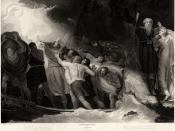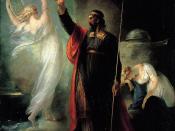Defined as the spirit of the air, Ariel has been the subject of much debate and discussion amongst critics and literary commentators who have for many years speculated about his nature and his unique and original characterisation. Act One Scene Two is the first time we meet this intriguing spirit, and it is Shakespeare's apt use of language, imagery and tone which helps to shape initial impressions of the character. The master-commander relationship Prospero and Ariel have with one another is effectively depicted in the way in which they speak to one another, their tone of language and the role they undertake in the scene. However, Ariel's role is much more advanced than just a mere servant or slave of Prospero, as Ian Johnston points out 'Prospero's power depends, in large part, on Ariel's release and willing service'. Although there are clear signs of a superior-inferior relationship between the two, it's far more complex than that, to an extent they are mutually reliant on one another, and just as we see in Act One Scene Two, are both essential for the development of the play.
The first appearance of Ariel immediately establishes his character as that of a submissive, deferential subject, as he enthusiastically responds to the call of Prospero, 'All hail, great master! grave sir, hail! I come To answer thy best pleasure'. Ariel's ceremonious greeting in lines 189-192 establishes Prospero's authority, dignity, and mastery of arts. Prospero's summoning of Ariel when he says 'Come away, servant, come. I am ready now. Approach my Ariel, come' helps the reader formulate initial impressions of their relationship. The fact that Prospero addresses him as 'servant' and with the pronoun 'my' paints Ariel as the inferior slave, under the command of his superior, Prospero. There is also an element of ownership, but it's perhaps more appropriate to use the term an element of debt and gratitude rather than ownership because of the historical content. Years before Prospero had arrived on the island; a witch by the name of Sycorax had been banished there from Algeria. Whilst on the island, she had imprisoned Ariel in a pine tree, had it not been for Prospero, he would probably have been left in the tree forever, thus, there is clearly an element of debt and gratitude involved.
The initial perception of Ariel is heavily influenced by his descriptive and poetic language. Ariel communicates through poetry and song, his language is ordered and stylistic. It portrays a mind at ease with his environment, a mind in which creativity and wit have sufficient room to develop. Furthermore, Ariel's speech is filled with alliteration, assonance, rhyme and meter- 'come unto these yellow sands...And sweet sprites, the burden bear'. The eloquence of his character is personified by the sea; Prospero applauds his beauty when he tells him 'Go make thyself like a nymph o' the sea.' The use of similes and metaphors throughout the act do much in helping the reader formulate initial impressions of Ariel, Shakespeare uses language as a means of introducing the character of Ariel to the audience. The characters in the Shakespeare's plays often reveal themselves in what they say and how they say it, what they do and how they do it, and in their behaviour towards others- Ariel is no different.
Tone of language is often used by analysts or commentators to assess the relationship between two characters. In the case of Ariel and Prospero a lot can be deduced, most obvious is this idea of possession, Prospero's commanding tone is evident throughout the dialogue with Ariel- 'O, was she so? I must Once in a month recount what though has been', the sarcasm in this line demonstrates Prospero's authority over Ariel, he reminds him, although sarcastically, that he is in debt to him. Ariel's tone also suggest an element of enjoyment at what he does, although he wants his freedom, to an extent it could be argued that line 300 when he tells Prospero 'What shall I do? Say what. What shall I do?' demonstrates to an extent, an eagerness to carry out the tasks set by Prospero. There could possibly be two explains for this, it is either out of his gratitude towards Prospero, or just that Ariel wants to be set free, however, its perhaps a mixture of the two which best sums up this enthusiasm. The tones adopted by both characters help the audience in understand their relationship, establishing Prospero as superior to Ariel.
Within Act One Scene Two Shakespeare invites the audience to make comparisons between Ariel and Caliban, and the attitudes they have towards Prospero, who in both cases is their master. Both Caliban and Ariel can be viewed as "colonized subjects" of Prospero, and the differing attitudes of these subjects towards their master is indicative of the differing ways in which human nature responds to modern civilisation. Furthermore, the language used by the two characters optimises their character, whereas Ariel uses poetry and eloquent language, Caliban uses the language of cursing- 'as wicked dew as e'er my mother brushed'. Ariel and Prospero's relationship with one another is made stronger when put besides that of Caliban and Prospero. Whereas Prospero uses his magic in order to subjugate Caliban, he uses it in order to free Ariel from the curse of Sycorax. The submissive attitude of Ariel in his relationship with Prospero stems from the debt that this engenders in him towards his master. Both Ariel and Caliban are individuals undoubtedly oppressed by Prospero, yet each develops a different relationship to their master based on their natural character as well as their prior circumstances.
The imagery used by Shakespeare in Act One Scene Two helps introduce the character of Ariel to the audience. The poetic language Ariel uses helps establish him as a character of beauty, the regular stress patterns in his comment to Prospero highlight this point:
'Not a hair perish'd;
One their sustaining garments nor a blemish,
But fresher than before: and, as thou bad'st me.
In troops I have dispeers'd them 'bout the isle'
Ariel's poetic and fluent language helps the audience develop images in their minds, the nature of his language and imagery reflects his character, and helps the audience in formulating initial impressions of him.
Throughout Act One Scene Two, Shakespeare's excellent use of language, imagery and tone helps to introduce the character of Ariel. It allows the character to establish himself through his language, the poetry and fluency of which reflects his nature, and helps the audience in understand his character. The scene also introduces Caliban, encouraging the audience to compare and contrast the two characters, and more importantly, their relationship with Prospero. Whilst Caliban and Prospero's relationship is simply defined as master and commander, the relationship of Prospero with Ariel is far more complex than that. The way in which Prospero treats each character helps the audience in formulating initial impressions of their relationship with one another. The apt use of language, imagery and tone within this scene allows Shakespeare to introduce Ariel to the audience in the intended manner, and is essential in helping the audience assess how he is presented.





